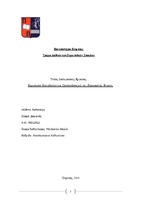| dc.contributor.advisor | Μενδρινού, Μαρία | |
| dc.contributor.author | Ποθητάκης, Δαμιανός | |
| dc.date.accessioned | 2017-10-19T07:33:43Z | |
| dc.date.available | 2017-10-19T07:33:43Z | |
| dc.date.issued | 2016 | |
| dc.identifier.uri | https://dione.lib.unipi.gr/xmlui/handle/unipi/10074 | |
| dc.description.abstract | Το Ευρωπαϊκό Κοινοβούλιο αποτελεί ένα από τα σημαντικότερα θεσμικά όργανα της Ευρωπαϊκής Ένωσης καθώς επίσης και το μοναδικό του οποίου οι εκπρόσωποι των κρατών μελών είναι απευθείας εκλεγμένοι από του ευρωπαίους πολίτες.
Η αναβάθμιση του ρόλου είναι μια συνεχώς εξελισσόμενη διαδικασία, από τις ιδρυτικές Συνθήκες μέχρι τη Συνθήκη της Λισαβόνας, με αποτέλεσμα αυτό να παρέχει στην Ευρωπαϊκή Ένωση την δημοκρατική νομιμοποίηση που χρειάζεται.
Στην παρούσα εργασία θα αναλυθεί διεξοδικά ο θεσμικός του ρόλος, η λειτουργία του καθώς και η αλληλεπίδρασή του με τα υπόλοιπα θεσμικά όργανα της Ευρωπαϊκής Ένωσης και θα επικεντρωθούμε στην συμβολή του στην κατάρτιση του ευρωπαϊκού προϋπολογισμού αλλά και στα πολυετή δημοσιονομικά πλαίσια.
Μέσα από την ανάλυση του ρόλου του στην οικονομική διαχείριση της Ένωσης θα παρατηρήσουμε ότι κατέχει σημαντικό ρόλο στη λήψη οικονομικών αποφάσεων και ότι αποτελεί το θεσμικό όργανο που «αφουγκράζεται» καλύτερα τους ευρωπαϊκούς λαούς. | el |
| dc.format.extent | 60 | el |
| dc.language.iso | el | el |
| dc.publisher | Πανεπιστήμιο Πειραιώς | el |
| dc.rights | Attribution-NonCommercial-NoDerivatives 4.0 Διεθνές | * |
| dc.rights.uri | http://creativecommons.org/licenses/by-nc-nd/4.0/ | * |
| dc.title | Ευρωπαϊκό Κοινοβούλιο και προϋπολογισμός της Ευρωπαϊκής Ένωσης | el |
| dc.type | Master Thesis | el |
| dc.contributor.department | Σχολή Οικονομικών, Επιχειρηματικών και Διεθνών Σπουδών. Τμήμα Διεθνών και Ευρωπαϊκών Σπουδών | el |
| dc.description.abstractEN | The European Parliament is one of the most important institutions of the European Union. Its members are directly elected members by the European citizens.
The enhanced role of the European Parliament has occurred as a result of a constant process of development mainly through Treaty amendments. This process has contributed considerably to the strengthening of the most needed democratic legitimacy of the European Union.
The present analysis attempts to thoroughly examine the European Parliament’s institutional role, its function and its interaction with the other EU institutions. For investigating the role of the European Parliament, the analysis proposes to approach European Parliament’s institutional change through the study of its role in the Union's finances. In particular, we will focus on its role in the EU’s budgetary politics and interactions regarding the European budget and the multiannual financial frameworks.
The analysis of the role of the European Parliament on the financial management of the Union demonstrates the important role of the European Parliament in the making of economic decisions as well as it responsiveness to the European people’s demands. The analysis argues that the European Parliament has often utilized its role in the EU budget as an instrument for advancing its role in the EU organizational framework and for promoting its policy positions in main EU policy areas. | el |
| dc.contributor.master | Διεθνείς και Ευρωπαϊκές Σπουδές | el |
| dc.subject.keyword | Ευρωπαϊκό Κοινοβούλιο | el |
| dc.subject.keyword | Ευρωπαϊκή Ένωση | el |
| dc.subject.keyword | Προϋπολογισμός | el |
| dc.subject.keyword | Δημοσιονομική πολιτική | el |
| dc.subject.keyword | Οικονομική πολιτική | el |
| dc.subject.keyword | Θεσμικό πλαίσιο | el |



